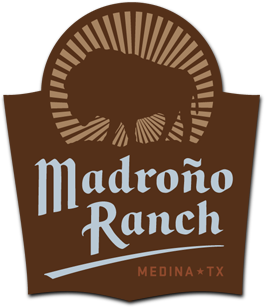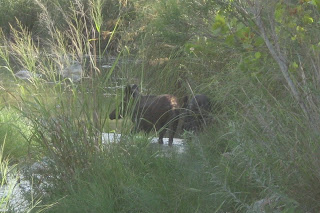I sometimes find myself feeling a little defensive about the Texas Hill Country. Martin, a San Francisco native, and I drove across the country via Texas after we graduated from college in Massachusetts. Somewhere around Bastrop, I said, “Well, we’re at the eastern edge of the Hill Country.”
“Really?” he said. “So where are the hills?”
Okay, so our hills are a little stumpy and our landscape a little scruffy, and most of the fauna (and much of the flora) will scratch, sting, or bite you. But at least we can proudly boast that nobody’s got more feral hogs than we do.
Hogs are always lurking in the background of life at Madroño—and frequently in the foreground as well (and yes, those are some of our very own hogs making their way across a creek in the photo above). They’re smart, secretive, social, fierce, and remarkably fecund; a sow can have two, and sometimes three, litters of eight a year. Robert, the ranch manager, figures that his wife Sherry shot the Madroño heavyweight title holder, which tipped the scales at about 400 pounds, and they can get significantly bigger than that. They have no predators other than humans, whom they generally leave alone. Dogs, however, they consider fair game. These hogs are expert at slashing their tusks in an upward arc, where they can easily intersect a dog’s jugular or stomach with deadly results.
One fall day a couple of years ago, my brother-in-law Daniel and I, along with his doughty dog Mojo, were walking along the top of the property. Mojo is an unspecified breed, maybe part wolverine, low to the ground with a long heavy coat, and utterly fearless. The minute he heard porcine snorting in a nearby cedar brake, he charged, even as Daniel and I screamed for him to stop. For the next few heartbeats of eternity we yelled and listened to the invisible fight as it receded down a draw. Sure that Mojo was a goner, we trudged sadly downhill to break the horrible news to my sister Isa—Daniel’s wife—and their young children.
So when Mojo popped out of the brush halfway down, he received an ecstatic and extended hero’s welcome. His ruff was stiff with pig spit; his thick fur had saved him from what were doubtless multiple tusk slashes. Many dogs aren’t so lucky.
Here’s one good thing about hogs: they make delicious sausage. Here’s another good thing about them: they’re omnivorous, eating even snakes. Here’s a(nother) bad thing: they love grubs, especially if those grubs are under wet grass. Carefully tended yards can look like a demonic rototiller has let loose its evil fury after a rain or a watering, the grass torn up and plowed under in great sheets (see below). Robert once got so furious at the persistent destruction of the lawn he’d tended so carefully at the lake house that he vowed to sleep there until he’d hunted the culprits down. After four nights and increasingly plaintive appeals from the family he’d abandoned, Robert admitted defeat. “Those pigs outsmarted me and whupped my ass in the lake house yard,” he said ruefully. “It was a humbling experience.”
Clearly, hog tales running the gamut from slapstick to philosophical will be a recurrent theme of this blog. Share your hog tales with us—and check back for more.
What we’re reading
Heather: Graham Swift, Last Orders
Martin: Brad Meltzer, Rags Morales, and Michael Blair, Identity Crisis


Heather and Marty-
My first comment! I just celebrated earlier this month my entry into the next decade (do you both share it with me yet?) by spending a few days near Tucsan. There, I saw my first feral hog! Actually about four of them. Interesting creatures. Even more interesting to see how humans respond to them! Great blog. You write beautifully. Brought back (recent) memories. Thanks for all the love and care you are putting into this effort. Go Ephs! Your Atlanta fan, Sharon
Many thanks, Sharon, and yes, we celebrated our "joint centennial," as Heather likes to call it, earlier this year.
I could tell you my hog tale, which is about Charlie, the boar who was the go-to guy at the little pig farm my father owned for small respites from his lawyer life … and my story would have included the fact that my sister trained Charlie to roll over (very slooooowly, since he weighed 600 pounds) for a tummy scratch with a 2×4 board … BUT, I would rather give you a great tip. We had a similar situation with digging varmints right here in the city limits of Austin with a persistent armadillo who made our front yard look like it could have been used as a set for the movie, Holes. We continually filled the holes only to find a bigger set the next day. We filled the garden with moth balls which we had heard would drive away unwanted critters, but our armadillo must have thought they were dinner mints, because he continued to be our nightly guest. The reason: GRUBS. My mother suggested, "If you get rid of the grubs, you'll get rid of the armadillo." She told me that Antidote, which is a natural product my sister developed for getting rid of fire ants, (beneficial nematodes) will also get rid of grubs. About two weeks after we doused our gardens with nematodes (the good kind): no grubs, no armadillo, no holes! You might share this tip with Robert so that he can avoid another night of hog vigilanteism.
Hogs or hawgs as we call them in East Tennessee, are something I found alluring when we first moved to Texas. Maybe it was because I was captivated by the idea of plentiful sausage running around loose or maybe it had to do with my love of the story of the Gerasene demoniac, or as I like to call the story, “Demons, hawgs and Jesus”. It seems Jesus coerces the demon Legion into a herd of "swine" only to have all that delicious barbecue run off a cliff.
Whatever the reason for my fascination with hogs, I vowed that one day my son and I would hunt these destructive yet delicious "pests". After a few unsuccessful hunts, we finally found a couple of hogs in south Texas. Bowman was the only one of eight of us to shoot not only one but two 85 pound sows.
He had been taught to clean and eat whatever he killed but I eventually gave in and helped him out. I guess it was the look he gave me as he was carefully cutting around the south end of a north bound hog; they are really unpleasant to clean. They have steel wire like hair, hoards of fleas and a legion of ticks scrambling away from their deceased host. After all of that, Bowman declared that he would just as soon never have anything to do with a hog again as long as he lived.
That's when I realized that maybe that had something to do with why there are so many of them running around loose.
Bo Townsend
We have no hogs (thank goodness), but the dogs have stepped up to the plate and have reduced our lawn to one big hole in search of the delicious grub. The good news is I can't mow the lawn anymore…you could lose an entire mower in there.
Remember, it is now legal to hunt them from helicopters. I'm just saying.
The problems with feral hogs: they stink to high heaven, make holes everywhere (bad for the horses), mess up your watering holes, and don't kid yourself – they WILL charge humans.
Seriously. Shoot the nasty suckers. Then go get a cute Wilbur for the barn.
SO – my word verification is 'licanimp' which kinda, you know, sounds insulting.